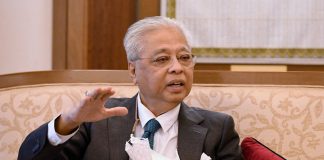KUALA LUMPUR, July 23 — With the country hit by the COVID-19 pandemic since a year ago, causing drastic changes in Teaching and Learning (PdP) methods from face to face to online through home-based learning and teaching (PdPR), teachers and students, as well as parents, are now adapting to the changes.
Although at the early stage, there were various obstacles and difficulties to implement the home-based learning and teaching (PdPR), over time, these problems have been overcome with various initiatives made without just relying on online PdPR.
Senior Administrative Assistant at Sekolah Kebangsaan (SK) Sega, Rantau, Negeri Sembilan, Intan Mardiana Roslan, 39, said she was now more comfortable with PdPR.
“When PdPR 1.0 (the first time) was implemented in March 2020, it was all done online, which not only made it difficult for students and parents to follow, but also put pressure on teachers with the problem on gadgets and Internet access.
“However, from the experience of the first PdPR, we took the initiative to improve the method for the second PdPR which started in November 2020 with various learning methods and no longer rely entirely on online .
“The results can be seen in the latest PdPR implemented since May 2021 which takes place in a calmer and more orderly manner,” she said when contacted by Bernama recently.
She said among the offline PdPR method was the use of modules containing several subjects taken by parents at school to be completed by students within a given period.
“We give the module once a week but the assignments are to be done in three weeks, after which the parents will come to school to send their children’s assignments.
“PdPR can be implemented more smoothly this time because we have coordinated it according to the needs and comfort of parents, guardians and students, as well as the school, using various methods, including the use of textbooks, exercises, Google Meet, YouTube, video calls, Telegram and WhatsApp, in addition to the use of modules,” she added.
Sharing Intan Mardian’s views is a civil servant, Suzana Ismail, 40, who said she was more confident now to help her three children, aged between six and 12, with their PdPR lessons.
“When PdPR was first introduced, it was disorganised and a bit chaotic, but after more than a year, we get used to it and I think it can be adapted to the children’s learning system. It was a bit chaotic at first, but now, it has become easier and more organised.
“The class teacher will provide the class schedule for the week and this allows parents to monitor and ensure the children are able to attend all the classes, and usually, video recordings of classes and school work are given after the end of the PdPR session. This allows parents to monitor their children’s assignments or school work,” she added.
She said the decision by the Education Ministry (MOE) to continue with PdPR until August 31 due to COVID-19, which is still a threat in the country, is a right move to avoid the emergence of education-related clusters.
Meanwhile, a teacher at SK Kimanis, Papar, Sabah, Azizah Hasan, 40, said although the PdPR session was chaotic for her at the initial stage of implementation as she also had to help out with her children’s lessons, it was smoother now.
“As a mother and teacher, I have to adapt to it, whether I like it or not. At first it was a bit chaotic because when doing PdPR with my students, I also have to help my two children, who are eight and seven years old, with their PdPR lessons.
“This situation is challenging but we have to be rational because it is not an option where we can choose. It has to be implemented as best as possible in ensuring our students and children do not drop out of school,” she said.
Although she is now able to adapt herself with PdPR, Azizah said she hoped students would be able to physically attend school as usual.
“I am sure what the Education Ministry is doing is the best in order to safeguard the health of students and teachers, but I really hope that if the school session can be back to normal in September, efforts must be made to ensure all staff, including teachers, have received both doses of the vaccine as a measure to reduce the risk of infection to students who have not been vaccinated,” she added.
On July 17 this year, the Ministry of Education (MOE) announced that the schooling session via PdPR will continue until Aug 31 this year after taking into account the current COVID-19 situation and following discussions with the Ministry of Health (MOH) and the National Security Council (MKN).
The MOE has also decided that schools will be opened in stages for physical teaching and learning rom Sept 1 after taking into consideration the current vaccination rate in the country.
















